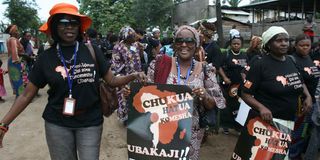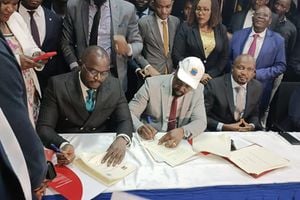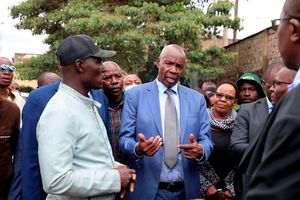Misogyny in politics: A call for an end to abuse and impunity

Women in Rutsuru, Eastern Congo, during a procession to reaffirm their commitment to support victims of sexual violence in North Kivu Province, Democratic Republic of Congo on December 14, 2010.
In the Democratic Republic of the Congo, women who engage in politics must be strong. Some of them: elected officials, candidates, and public women are insulted, threatened, humiliated, harassed, traumatised, excluded, etc.
For others: it is out of the question to provide them with incentive measures or positive discrimination; women must struggle “with their own means", even though the Constitution underscores that women have the right to fair representation, within national, provincial, and local institutions and the State must guarantee gender parity.
Despite this provision included in the Basic Law, cases of calls for rape, cyberbullying, hate speech and disinformation campaigns may disqualify and deter women from entering or remaining in the political arena.
In this regard, the new Digital Code brings hope to prevent some abuses. However, for the time being, few of the parties or political groupings with which those who have experienced violence are affiliated, have documented or condemned the attacks and incidents and, even less, have demanded a judicial investigation so that the perpetrators are punished.
Double penalty
Too often, despite conclusive evidence, the aggressors, sometimes repeat offenders, are not prosecuted, or punished; a double penalty for the victims, who find themselves isolated and disarmed, due to lack of adequate legal, moral and psychological support.
On the occasion of the commemoration of the International Day of the African Women, established on July 31, 1962, by the UN and officially dedicated by the former OAU (now African Union) on July 31, 1974, it is our responsibility to showcase what Congolese women are able to do, what they represent and what they could bring to their country and to the African Great Lakes Region, if they were given a broader opportunity to invest themselves, like men, in the political life.
Congolese women make up more than 50 per cent of the electorate but are currently only about 12 per cent in the National Assembly and a little less than double (23.85%) in the Senate. Contrary to the prevailing misogynistic discourse, it is proven that identifying, training, and aligning female candidates would offer a precious opportunity to increase political weight.
The statistics on this subject speak for themselves: a well-prepared candidate is almost always elected. The revised electoral law is a golden opportunity with its article 13 which provides an incentive measure exempting lists with a minimum of 50% of candidates from the payment of a deposit.
This is critical insofar as it is mostly men who run many political parties, institutions, and the media. They, therefore, have the means and the responsibility to reinforce disciplinary commissions and codes of conduct; to systematically document, denounce and lodge a complaint in the event of abuse; to set a quota for women candidates to be put forward for the elections; to organize mixed primaries; to pre-finance female candidates; or to introduce preferential rates for contributions.
Gender-based- violence
On the legal level, during the parliamentary recess (June 15-September 15), the Government is planning to issue a decree on the prevention and repression of gender-based violence. Perhaps this is a great opportunity to secure women's political space and, in case of abuse, to ensure a holistic response, including psychological ones.
In a similar vein, the media should open their space to women politicians and guarantee a balanced treatment of information concerning them – away from stereotypes.
Similarly, men’s commitment will also help open up debates, and pull out of the momentum in which women are campaigning for women; of course, women have their part to play.
They should dare to introduce themselves, first, then consolidate their positions and support themselves for example, by pooling their resources to finance campaign materials, witnesses, and lawyers. And above all, they should serve as mentors for each other to enrich the pool of potential and eligible candidates, until the glass is entirely broken.
Strengthened by this support, Congolese women could take up the challenge of increased political representation during the upcoming legislative elections, scheduled for the end of the year.
The United Nations, through MONUSCO with the United Nations Development Program (UNDP) and the UN Women, continues to support institutions and political entities to achieve this objective.
Thus, in addition to capacity-building sessions and the dissemination of the electoral texts, collaborate with the Independent National Electoral Commission (CENI) to continue to push for the taking into account of gender-related considerations in their work as well as the National Human Rights Commission (CNDH), for the prevention, alerting and response to gender-based violence.
Ms. Bintou Keita, Special Representative of the UN Secretary-General, and Chief of the United Nations Organization Stabilization Mission in the Democratic Republic of the Congo




